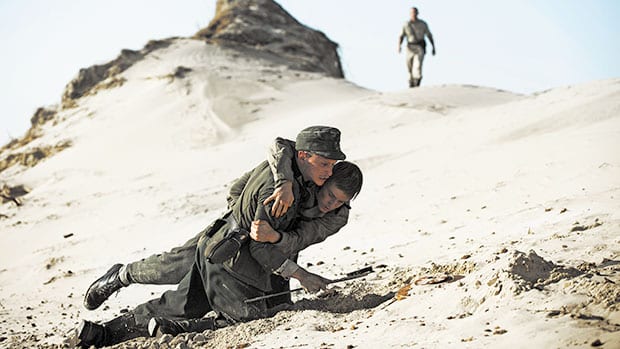Runner-up Oscar nominees might be better than the winners

German soldiers are forced by a Danish sergeant to defuse thousands of mines on a beach in ‘Land of Mine.’
The war is over, and the Nazis lost. You’d probably assume German soldiers fighting in other European countries put down their arms and marched back home. Only that’s not what happened for many young Germans in Denmark. That small northern Ally Power was riddled with land mines — many more than most other countries. And before the war could truly be over, someone would have to disarm thousands upon thousands of them. And since the Germans planted them, the Danish authorities conscripted them as bomb disposal units.
“Justice,” you probably think. “Damn Nazis deserve what they got.”
And then you see Land of Mine, one of the five films recently nominated for the Best Foreign Language Film Academy Award (it lost to The Salesman), and your moral compass begins spinning like a top.
Putting men in the way of uncontrollable explosives has been a conceit of filmmakers going back to Henri-Georges Clouzot’s 1953 film The Wages of Fear (remade in the 1970s as Sorcerer) to Speed and beyond. But somehow, this time if feels less like a gimmick than a metaphor for the intensity of emotions on both sides.
You want to sympathize with Sgt. Rasmussen (Roland Moller), the Danish officer charged with training and disciplining the German boys (none are over 20) tasked with defusing an entire beachhead of buried ordnance. Rasmussen is more than a tough drill sergeant, though; there is malice in his heart and he deceives and endangers the soldiers, none of whom where in any position to set policy at the Reichstag or probably even shoot at another combatant. They dream mostly of their girlfriends back home, their moms’ cooking and what they will do now that the war is over.
Of course, not all of them will make it back. Who knows how many — if any — will?
Land of Mine is a raw and powerful film — more honest and intense, even, than Hacksaw Ridge, and for my money the best foreign language film of the nominees this year. But it’s neither easy nor entirely satisfying. Like All Quiet on the Western Front, it humanizes the enemy and reminds us that happy endings and wartime rarely go together.
Now playing at the Angelika Film Centers in Dallas and Plano.
Zucchini lives with his alcoholic mother in a tenement, trying to avoid dear ol’ mom when her BAC and her abusive nature dovetail and she takes her frustrations out on him. One day, when he retreats to the attic he calls a room, he slams the door in the floor to keep his mom out… and never sees her again. Gripped with guilt that he may have killed his own mother, he’s sent by the authorities to a group home to wait for adoption — or, more than like, age out of the system.
There, Zucchini meets the motley crew of fellow orphans — some whose parents abandoned them, some whose parents are now imprisoned and all of whom are just as damaged as he.
My Life as a Zucchini, which lost the Oscar for Best Animated Feature last week to the crowd-pleasing Zootopia, is surely one of the more heartfelt and whimsically beautiful features on recent vintage. At barely 70 minutes, there’s not a lot of meat on its bones, but as the saying goes, what’s there is choice. It’s both colorful (Play-Doh-ish stop-motion creatures that are both fantastical and human) and dark (the tone, the shadows, the doleful looks). It’s reminiscent of Tim Burton, but with less cheeky cynicism.
Screen both in French with subtitles and dubbed in English. Now playing at Landmark’s Magnolia Theatre.
This article appeared in the Dallas Voice print edition MARCH 10, 2017.


